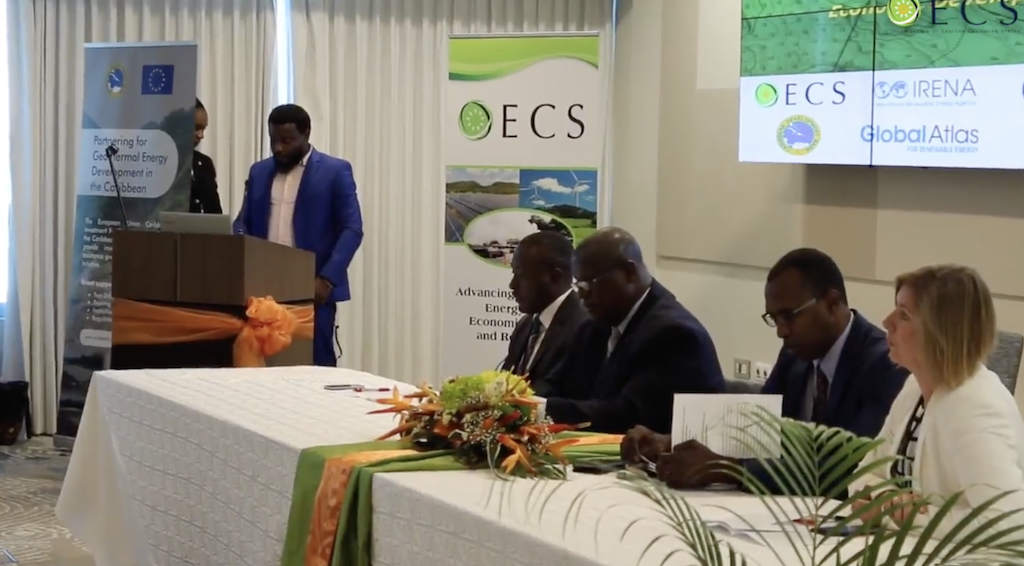Caribbean embracing new classification scheme for geothermal resources

The Caribbean is embracing a geothermal resource specification scheme introduced recently at a workshop by IRENA, the International Geothermal Association and the World Bank.
In an article the International Renewable Energy Agency (IRENA) reports on a recent workshop held in Saint Lucia, Caribbean as part of a project to introduce a geothermal resource classification scheme in partnership with the International Geothermal Association and the World Bank.
The Caribbean is blessed with sun-soaked beaches, calm coastal waters and a laidback vibe, but beneath its serene shores lies a vast and largely unexplored source of low-carbon energy. Geothermal energy potential across the Caribbean’s 700 or so islands, islets, reefs and cays is significant.
To date, however, accessing that energy has been a challenge, due to high exploration costs and a corresponding lack of investment certainty. As a consequence, the resource remains largely under explored, but new joint-efforts led by IRENA are changing that, and in turn helping the Caribbean to increase energy security and meet national and international commitments to low-carbon energy development.
A workshop co-organised IRENA, the Organisation of Eastern Caribbean States (OECS), the World Bank, and the International Geothermal Association, represented a starting point. Held in Castries, Saint Lucia, the workshop brought together 60 key experts and geothermal energy decision makers from across the Caribbean to discuss challenges and co-develop solutions to advance geothermal development.
Saint Lucia’s Minister for Infrastructure, Ports, Energy and Labour, Honourable Stephenson King attended the opening of the meeting. He said an opportunity now existed for a strategic and collaborative approach to developing geothermal resources in the region. He encouraged countries in the Eastern Caribbean to speak with one cohesive voice and to work towards establishing a geothermal industry vision across the region, highlighting that advantages exist by pooling resources together.
IRENA’s Abdulmalik Oricha Ali, IRENA’s lead on developing tools for early-stage renewable energy prospecting, said the need for strong risk mitigation instruments for geothermal energy production was desperate: “There is a dire need to make geothermal attractive to a broader category of investors – especially equity investors, who are often not geologists or renewable energy experts for that matter and have no sentiments or mandates to invest in a specific region.”
Lowering risks for rewards
The workshop’s discussion centred on the nature of the geothermal projects in the Caribbean and addressing their underlying risks — particularly highlighting risk mitigation and financing options.
“To make smart investment decisions investors must first understand the quality and associated risks of a project,” said Ali. “This is why we have joined efforts with the IGA and the World Bank on this pilot project to de-risk geothermal projects through standardised classification and communication of resource estimates on prospective geothermal fields, their technical feasibility and marketability,” he explained.
The workshop is the continuation of an international series to pilot the ‘United Nations Framework Classification (UNFC) to Geothermal Energy Resources and Reserves’ — a harmonised framework for qualifying estimates of extractable geothermal energy by projects. Taking into account economic viability, technical feasibility and geological confidence, the UNFC specifications are designed to help stimulate geothermal investments by making geothermal resource bases easier to understand. While a previous workshop tested the specifications at national-level in 14 different cases on the Indonesian island of Flores, the workshop in Castries for the first time tested the system at a regional-level, with five trials from five different countries.
The dialogue introduced the efforts of different international and local institutions supporting to address these challenges in the sub region, and introduced key stakeholders in the Caribbean to the UNFC Geothermal Specifications, including their scope, technical requirements, and value.
“Attendees got so much value out of understanding the wider aspects of geothermal projects what can constrain them — and that’s what the classification is all about. Furthermore, the workshop stimulated a lot of discussion amongst regulators, developers, and utilities,” says Greg Usher, an expert from the IGA.
“Geothermal energy can provide the Caribbean hurricane resilient, cost efficient and reliable energy around the clock,” says Executive Director of IGA Dr. Marit Brommer. “With ongoing development, things are looking up for a further push, while more regional cooperation and wider financial support is needed to see further development,” she added. Momentum for cooperation amongst islands is growing, in geothermal energy and other renewables, and even beyond the Caribbean.
The workshop is aligned with other efforts IRENA conducts with Small Island Developing States (SIDS) — a worldwide collection of island states particularly at risk to climate change, and keen to find global solutions with renewables. In September, during the United Nations General Assembly, IRENA with its SIDS partners launched the ‘SIDS Lighthouses 2.0 Initiative’ — an update to the IRENA-led initiative that helped deploy over 120 megawatts of renewable electricity and mobilise USD 500 million in funding for SIDS, two years ahead of schedule.
Source: IRENA